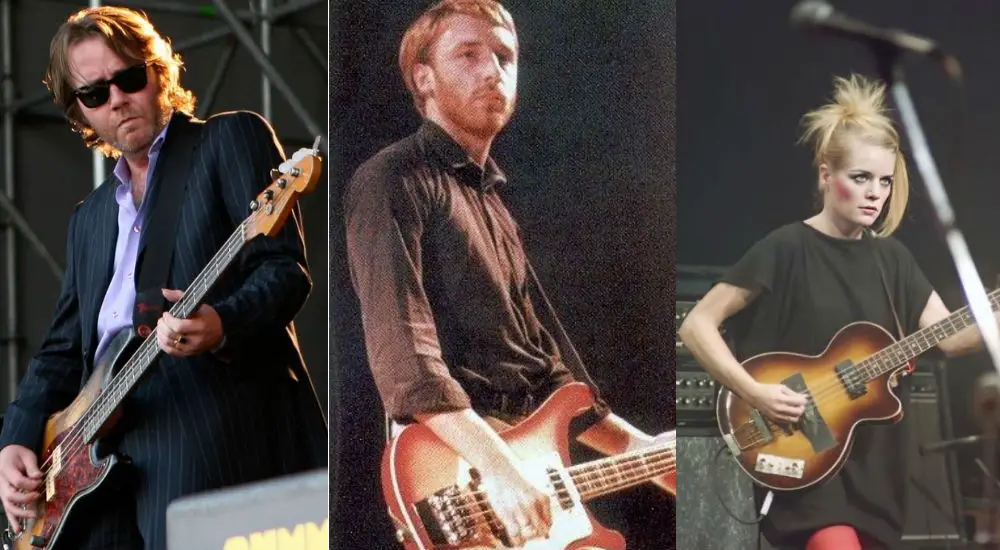The Best Indie Rock Bassists Of All Time Ranked
In the early 2000s, a new group of bands that played a stripped-down, back-to-basics version of guitar rock emerged into the mainstream. The commercial breakthrough from these scenes was led by four bands: The Strokes, The White Stripes, The Hives and The Vines. Emo also broke into mainstream culture in the early 2000s. By the end of the decade, the proliferation of indie bands was being referred to as an “indie landfill”, with the term “landfill indie” becoming used by some critics/websites in the 2020s as subgenre for a certain type of 2000s indie band, in the same way Britpop is used for British guitar music of the 1990s. Here are all of the best Indie Rock Bassists of all time ranked.
See more: The Best Metal Singers Of All Time Ranked
See more: The Best Metal Guitarists Of All Time Ranked
10. Martyn P. Casey

“His playing on the Bad Seeds’ 1994 classic ‘Red Right Hand’ is simple albeit effective, with a rolling bassline that serves as the ideal bedrock for all the bells and whistles (literally) superimposed by the mad genius that is Nick Cave. On the menacing ‘Stagger Lee’, Casey supplies a subtle, descending bassline, whilst Conway Savage attempts to break every hammer and string on his piano with some thumping chords.”
9. Kim Deal

“Rhythmically, Deal departs from the customary locking-in with the drums, and often opts for straight eighth-note patterns that serve to drive the music. The chorus on ‘Monkey Gone To Heaven’ showcases this to a tee. Throughout the verses, her bass gels superbly with the gritty cello section, and is arguably some of her best playing on the album.”
8. Norman Cook

“Cook’s grooves with The Housemartins were by no means a masterclass in technical proficiency – his skill, however, lay within his harmonically innovative style of bass playing. Cook would often avoid playing the root note in a chord, instead opting for the third or fifth in order to provide a more ambiguous angle to the music.”
7. Nick O’Malley

“O’Malley’s bass playing finds itself, at times, in the foreground: on tunes like ‘The Hell Spangled Shalalala’, he plays a wicked countermelody that cleverly snakes around Jamie Cook’s sturdy guitar track. In other instances, he plays more of a supporting role: ‘Cornerstone’ taught me a great deal as a bassist about the importance of playing for the song.”
6. Alex James

“One of James’ defining attributes is his knack for creating a song within a song: something Christopher Nolan would certainly be proud of. His playing on the quasi-symphonic ‘The Universal’ showcases this, whereby James’ exquisite bass part is almost as hummable as the song itself.”
5. Nikolai Fraiture

“The warm tone of his Jazz Bass propels this deft countermelody to the fore, and ultimately stands out as some of the most tasteful playing put to record over the past two decades. On ‘Machu Picchu’, Fraiture keeps a rather peculiar groove afloat with some sporadic 16th notes, before imparting his more melodic side in the chorus.”
4. Mike Mills

“Mike Mills’ bass playing is one of the main catalysts that sets R.E.M. miles apart from their predecessors and contemporaries. Their 1981 debut single ‘Radio Free Europe’ is a blistering introduction to the world of R.E.M., with Mills’ low-end frequencies being a vital ingredient in the mix. Throughout the verse, he keeps things moving with a pulsating eighth note rhythm.”
3. Tina Weymouth

“Weymouth used a variety of basses throughout her tenure with Talking Heads. On the live version of Psycho Killer, she makes a Fender Mustang sound punchier than ever, with an iconic riff that consists of a mere three notes – one that is forever embedded in the collective bass psyche.”
2. Peter Hook

“His first band, Joy Division, released two seminal records, before the tragic suicide of lead singer Ian Curtis eventually led to the formation of the subsequent New Order. Hook’s antithetical bass style with both bands can be summed up in three words: drones, effects, and riffs.”
1. Andy Rourke

“Andy Rourke is undoubtedly one of the most creatively gifted bassists of all time. His musical chemistry with bandmate and best friend Johnny Marr was the nexus that defined The Smiths, with songwriter Marr always granting Rourke full autonomy over his bass parts.”

